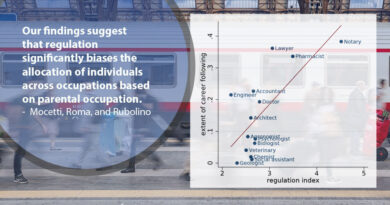Completing an Internship Increases Wages and Probability of Employment
The share of university students completing an internship is as high as 75–80 percent in many countries throughout North America and Europe. For these students, internships can facilitate the transition from education to the labor market. How much do these internships affect students’ labor market outcomes? In a recent JHR article, Shushanik Margaryan, Nils Saniter, Mathias Schumann, and Thomas Siedler shed light on this question by analyzing data on German students.
A simple comparison of students who completed an internship and those who did not might be misleading because the decision to embark on an internship is not random and may depend on multiple individual characteristics, such as motivation or ability. To resolve this issue, the team compared students who studied at the same university, in the same department, and majored in the same area of study, but, depending on their year of admission, were either obliged to complete an internship or not. This comparison is possible as universities introduce and discontinue mandatory internships over time.
They find that university students have an 80 percent higher likelihood of completing an internship if the internship is mandatory. Subsequently, on average, these students have 6 percent higher earnings five to six years after graduation. The earning returns are even larger for students who graduate from areas of study with a weaker labor market orientation, such as humanities.
These findings have important policy implications—combining university education with practical experience can ease young people’s transition to the labor market and enhance their job market-relevant skills, resulting in better income a few years into their working lives.
Read the study in the Journal of Human Resources: “Do Internships Pay Off? The Effects of Student Internships on Earnings,” by Shushanik Margaryan, Nils Saniter, Mathias Schumann, and Thomas Siedler.
***
Shushanik Margaryan (@shushmargaryan) is a Ph.D. student at the Universität Hamburg. Nils Saniter is a former Ph.D. student at DIW and an IZA fellow. Mathias Schumann is a former Ph.D. student at the Universität Hamburg. Thomas Siedler (@ThSiedler) is a professor at the Universität Hamburg and an IZA fellow.




